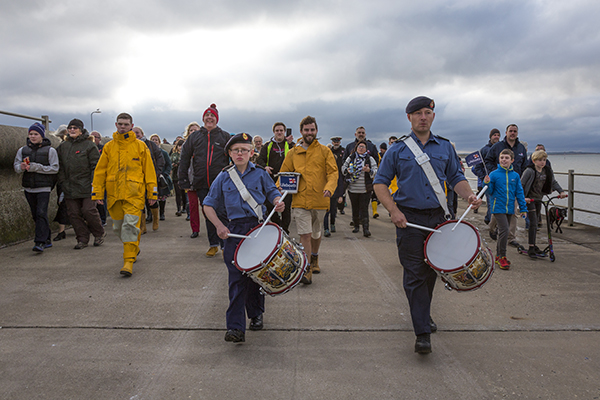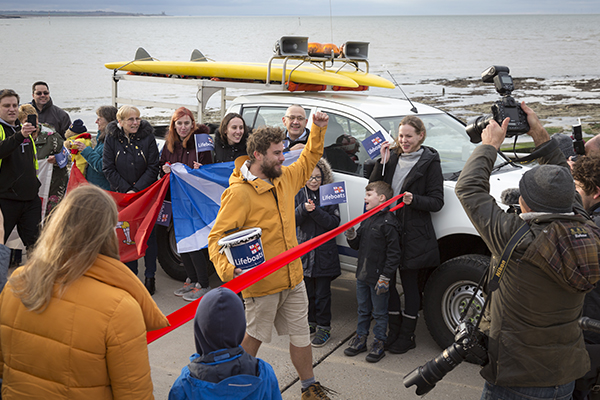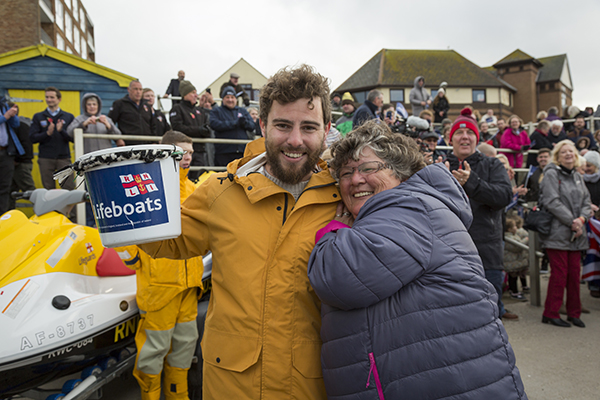Alex Ellis-Roswell left home in Kent in 2014 to walk 9,500 miles round the coast of Britain and Ireland, visiting each RNLI station, to raise money for the lifesaving charity in memory of his late father. Words: Susie Moss
Photographs: Sheradon Dublin Photography
What would you miss most if you left home for a three-year walk with nothing but a backpack? Friends and family? Favourite TV shows? Clean socks? For Alex Ellis-Roswell it has been a kitchen; the opportunity to cook his own food, what and when he felt like. In 2014 at the age of 21, Alex set off to walk around the British Isles coast. Inspired by his recently deceased father’s dedication to fundraising and charity work, he decided to try to raise some money for the RNLI. He thought he would be walking for around a year. Three years later, he finally completed his epic 9,500-mile journey.
‘I didn’t realise it when I set off – not consciously – but I guess I was walking through my grief,’ says Alex. ‘I relished my time alone, just walking, and I wanted a challenge.’ Despite coming close to giving up sometimes, Alex stuck at it, remembering his father’s stubbornness in the face of illness. Alex’s initial aim of raising £10,000 has been far surpassed and now he has raised more than £70,000. ‘Growing up in Kent, messing about on or near water has always been part of my life, and my father had a boat on the Medway Estuary. We were always aware of the RNLI, and the incredible work they do. £70,000 is enough to run a lifeboat for 10 years,’ he says.
STARTING OUT
Alex sold his business, left his flat, gave away most of his stuff, and, on his late father’s birthday in August 2014, set off with about £3,000 in his bank account, a 20kg backpack on his back and a tent he’d never put up before. He aimed to walk around 20-25 miles a day, and camp wild most of the way. However, heading clockwise around the British coast meant he had a tough initiation, from storms lashing the tent in the eerie landscape of Dungeness to the stunning but harsh South West Coast Path. The Cornish section was beautiful, yet the most challenging for the long-distance walker, with multiple flights of steep steps up and down to cover a cruelly short distance – a real killer for the knees, as Alex discovered. ‘The constant rigour of walking every day really took its toll and by the time I got to West Cork in Ireland, my legs had packed up. I stopped for a two-week break and saw a physio – aka sadist – called Brian Power, who shared with me his view on my planned journey.
“How much further are you going?” he asked me.
“Another 6000 miles,” I said.
“Well you’re not going to make it,” he said. “No way.”
‘This was like red flag to a bull for me, and my determination to finish set in. It’s my stubbornness that’s really seen me round.’
After two weeks of treatment from Brian, Alex set off again, but from then on was more careful with his pace and distance, walking less, or walking three days, then resting one. ‘There were times when it really sucked. I had three months of rain and weekly hurricanes in Ireland, but I wasn’t going to give up.’

ALWAYS GRATEFUL
Food on the journey was unpredictable; feast or famine depending on how remote he was, what shops were available, and the kindness of strangers. Alex is far too diplomatic to say what his favourite place was, or where was the friendliest, but he happily concedes the best and most surprising thing for him during this journey has been the people – ‘the people are incredible!’
Where the conditions were the most inhospitable, Alex found the people were often the most hospitable. In wind-lashed Ireland many gave him shelter from storms. In one village on the west coast, Alex stopped to give a talk in the primary school, and all 100 of the children walked out of the village with him in the pouring rain to show their enthusiastic support.
As he walked, his Facebook following grew with him, and he now has over 11,000 followers whom he constantly thanked and entertained along the way with amusing anecdotes of his journey: thoughts from life on the road, and wonderful descriptions of characters he encountered. The power of this online community helped him continue; enabling him to find a bed for the night, accept offers of warm cups of tea or grub in a local pub, or even help with his heavy backpack when needed – such as in Northern Scotland when his hips were giving him pain, or the time when he fell and fractured an ankle and tore a ligament.
‘In St Ives, for example, I spent most nights outside in a sleeping bag under the steps of the RNLI lifeguard hut. When it rained, I had to shuffle round to stop the rain dripping on my face. The sunrises were great on that beach. One day there was a shoebox left at the lifeboat station for me. Inside were socks, sweets, toothpaste, books and a note from Daryl and Beth. Daryl was 11 and Beth was 13. They left it there while they were down in Cornwall on holiday. It was one of the nicest and most unexpected things to happen that Christmas. Getting that shoebox from two kids I’d never met before gave me a lot of strength.’

VITAL WORK
At times Alex missed his mum and his close friends, he thought about his dad a lot too, but he was rarely short of company. He loved meeting people on the route, and they would often join him on parts of the walk. But sometimes he missed the solitude. He loved the long stretches alone, and grew used to having time to just be. Constantly on his mind was the work of the RNLI crews and his fundraising mission. His respect for the charity grew with each encounter of a RNLI lifeboat station. The friendly crews would offer places to stay, and a night out to share stories. Often he was there for a call-out and could see the dedication of the incredible volunteers. He learnt a lot about the dangers they face and how the reasons for call-outs vary considerably from place to place.
‘In Whitstable, say, the dangers are for holiday-makers using jet skis and inflatables, unaware of the sand banks. In Northeast Scotland where the Atlantic meets the North Sea, the waters are treacherous and even the most experienced boats can get into trouble there. However, the busiest lifeboat stations are inland on the Thames Estuary, where Tower, Chiswick and Teddington stations are tragically kept busy with suicide attempts,’ he explains.
The RNLI has 237 lifeboat stations, crewed almost entirely by volunteers. They operate a 24-hour rescue service and have an average of 24 call-outs a day. In 2016, volunteers launched 8,851 times around the coast of the UK and Ireland, rescuing an average of 23 people a day. Alex can’t think of a charity he’d rather be raising money for, and is so proud to have visited all 237 stations and met some real heroes.
NATURAL BEAUTY
As well as the people he met on the way and the incredible lifeboat crews, Alex has been awestruck by the sheer beauty and wildness of our coastline. One of his most spectacular sights was the seabirds at Bass Rock in the Firth of Forth, the world’s largest gannetry with around 150,000 gannets. However, as well as beauty, Alex also saw many things that concerned him. He saw seals washed up in beautiful places choked by plastic, and birds tangled in plastic holders from beer can packs. ‘The more time I spent in nature, the more blindingly obvious it became that we can’t continue living this way. Wherever you go, from Brighton to Shetland, our manmade pollution is everywhere.’

THE END OF A JOURNEY
Alex finished his walk back where he started in Minnis Bay, Kent, on 11 November 2017, greeted by local and national supporters, the press, RNLI and his mother. What is the biggest lesson he learned from his journey? ‘That people are good. Basically good. Trust people, help people,’ he says. And what’s next for Alex now that his epic walk is finished? ‘Well, hopefully a book,’ he says. ‘And maybe a break! Somewhere hot for a change.’
Alex has raised £70k for the RNLI. His target is £95K – £10 for every mile he has walked. If you can donate, please go to bt.com/donatetolifeboats.
See more of Alex’s adventures on Facebook here.
Alex has raised £70k for the RNLI. His target is £95K – £10 for every mile he has walked. If you can donate, please go to bt.com/donatetolifeboats.










